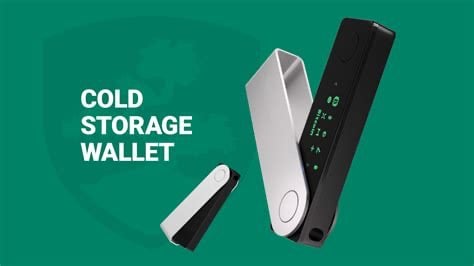Cold Storage for Crypto is a Must Have
When it comes to storing cryptocurrencies securely, cold storage stands out as one of the most effective methods available. Unlike hot wallets, which are connected to the internet and therefore susceptible to hacking and online threats, cold storage keeps private keys offline, significantly reducing the risk of unauthorized access and theft.


When it comes to storing cryptocurrencies securely, cold storage stands out as one of the most effective methods available. Unlike hot wallets, which are connected to the internet and therefore susceptible to hacking and online threats, cold storage keeps private keys offline, significantly reducing the risk of unauthorized access and theft. Here's why cold storage is considered the best option for storing cryptocurrencies:
1. Enhanced Security: Cold storage eliminates the risk of online hacking and cyberattacks, as private keys are stored offline on hardware devices or paper wallets. Without an internet connection, cold storage devices are immune to remote attacks and malware infections that could compromise the security of hot wallets. This enhanced security makes cold storage ideal for storing large amounts of cryptocurrencies or long-term investments.
2. Protection Against Online Threats: Hot wallets, such as those provided by exchanges or online platforms, are vulnerable to a range of online threats, including phishing attacks, malware infections, and hacking attempts. By keeping private keys offline, cold storage protects cryptocurrencies from these online threats, providing peace of mind to users concerned about the security of their digital assets.
3. Reduced Risk of Exchange Hacks: Centralized cryptocurrency exchanges are frequent targets for hackers due to the large amounts of digital assets stored on their platforms. In the event of an exchange hack or security breach, users may lose access to their funds or suffer significant financial losses. Cold storage removes the need to trust third-party exchanges with custody of cryptocurrencies, reducing the risk of loss in the event of an exchange hack or insolvency.
4. Offline Backup: Cold storage devices, such as hardware wallets or paper wallets, serve as secure offline backups of private keys. In the event of a hardware failure, loss, or damage to the primary storage device, users can easily recover their funds using the backup copy stored in cold storage. This redundancy ensures that cryptocurrencies remain accessible even in the face of unforeseen circumstances or disasters.
5. Control and Ownership: With cold storage, users have complete control and ownership of their private keys, eliminating reliance on third-party custodians or intermediaries. This self-custody model aligns with the ethos of decentralization and empowers users to take responsibility for the security of their digital assets. By maintaining control over private keys, users retain sovereignty over their funds and can transact with cryptocurrencies freely and
